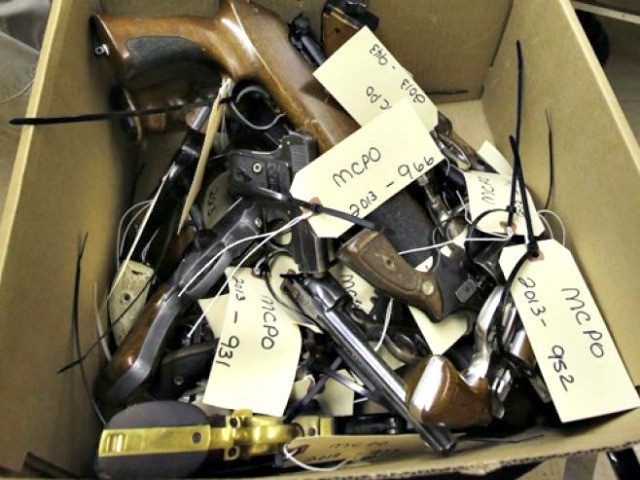A group of San Francisco medical marijuana dispensaries helped local law enforcement with its gun buyback program on Saturday by contributing thousands of dollars to help fund the effort to take guns off the streets.
According to the San Francisco Chronicle, Saturday’s event at the Ella Hill Hutch Community Center was successful in buying back at least 91 guns, including an AR-15 assault rifle. Marijuana industry attorney Brendan Hallinan told the paper that he raised $50,000 last year from three marijuana dispensaries — the Green Door, Barbary Coast, and Grass Roots — to help fund the city’s gun buyback program.
“There is this idea that pot clubs have a negative impact on the community and are a drain on law enforcement,” Hallinan told the Chronicle. “They were really excited and see this as a way of improving community safety. Youth violence is a big problem. It was just a really nice fit.”
Saturday’s event followed another in December, in which 100 guns were reportedly bought back. The city offers $100 for handguns and $200 for assault weapons. When funding for the buyback program became tight last year, the coalition of marijuana dispensaries reportedly offered the city financial help.
“We wondered if it would be something they (police) would support,” United Playaz youth organization executive director Rudy Corpuz told the Chronicle. “They said that we can come together as a partner as long as we get guns off the street.”
Corpuz told the paper the buyback program was a resounding success.
“A lot of these guns that are turned in were guns that were laying around, and people don’t use them,” he said. “I just want to let people know: I’m not against people bearing arms.”
John Vernick, of the Johns Hopkins Center for Gun Policy, told the Chronicle that studies show that gun buybacks are often ineffective.
“The highest-risk guns for being used in crime tend to be newer, tend to be higher-caliber,” Vernick told the paper. “They tend to be semiautomatic pistols instead of revolvers. More importantly, they tend to be functional instead of broken.”
Still, tech entrepreneur Ian Johnstone, who reportedly began crowdfunding for the city’s gun buyback program in 2013, told the Chronicle that the buyback program was a success, and applauded the involvement of the marijuana clubs.
“I think it is really cool that the medical marijuana community is getting involved,” Johnstone told the paper. “Buybacks show how broadly gun violence impacts. There is a diverse group of people coming together to work on these things. It’s not a black thing, not a white thing. We are all put at risk.”

COMMENTS
Please let us know if you're having issues with commenting.